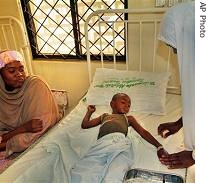2006年VOA标准英语-Millions Benefit From Measles Campaign in Niger(在线收听)
By Gilbert da Costa
Abuja
08 October 2006
 Five year-old Abubaker Kabir who is suffering from measles receives medication while his mother Ladi Kabir, left, watches in Kano hospital, Nigeria (File photo) |
||
-----
It was an unusual mix of screaming children and smiling mothers at the Avu Health Center in Owerri, the capital of Imo state in southeastern Nigeria. Hundreds of mothers brought their children to the center for a measles shot and a polio booster.
Nigeria, Africa's most populous country, is conducting an aggressive campaign to check an alarming increase in deadly, yet easily preventable diseases.
Kate Duru, whose four children were vaccinated at the Avu Center, told VOA that she was delighted, and urged other parents to take advantage of the free vaccination.
"Every parent should gather their children and take them to the place and immunize them. It is better for them to bring their children to immunize them," she said. "It helps our children, protecting them from measles and other sicknesses."
Measles is a leading cause of death among children in Nigeria. The Health Ministry says several hundred die every year.
With the public health system in crisis, routine immunization represents the one of the simplest ways of reducing child mortality in Nigeria.
Victor Muruako, chairman of the Owerri West local government, says a successful campaign is extremely important.
"We have ensured that the people are adequately enlightened on this campaign, because measles and polio are two issues that are very serious," noted Muruako. "You find some of these children disabled and handicapped, because they did not receive particularly the right vaccination at the right age. We do this by public enlightenment, sensitization, mobilization and by supporting the health department, and also working in partnership with other donors to ensure that the programs are well executed."
In addition to measles inoculation, children are receiving polio vaccines and vitamin-A to boost their immune system, as part of a unique integrated health campaign.
The World Health Organization says routine immunization coverage last year reached only 35 percent of the target population.
The Nigerian government, with the support of international partners, such as the WHO and UNICEF, has resolved shortcomings that plagued previous immunization efforts.
More than 110,000 health workers have been mobilized, and 35 million doses of measles vaccines, 28 million doses of oral polio vaccines and vitamin A have been provided.
Volunteers canvassed their communities in the days leading up to the measles campaign, ensuring high turnouts in most parts of the south.
Adolphus Okolo, who runs the immunization program in Imo state, is positive the 100 percent target is achievable.
"We are optimistic that we will achieve a very high level of success," said Okolo. "We are used to campaigns in Imo state, and we have never failed in achieving the target. We must have to achieve, and we are going to achieve what we expect to achieve."
The singing and celebratory atmosphere at the crowded Avu Health Center suggests his optimism is not misplaced.